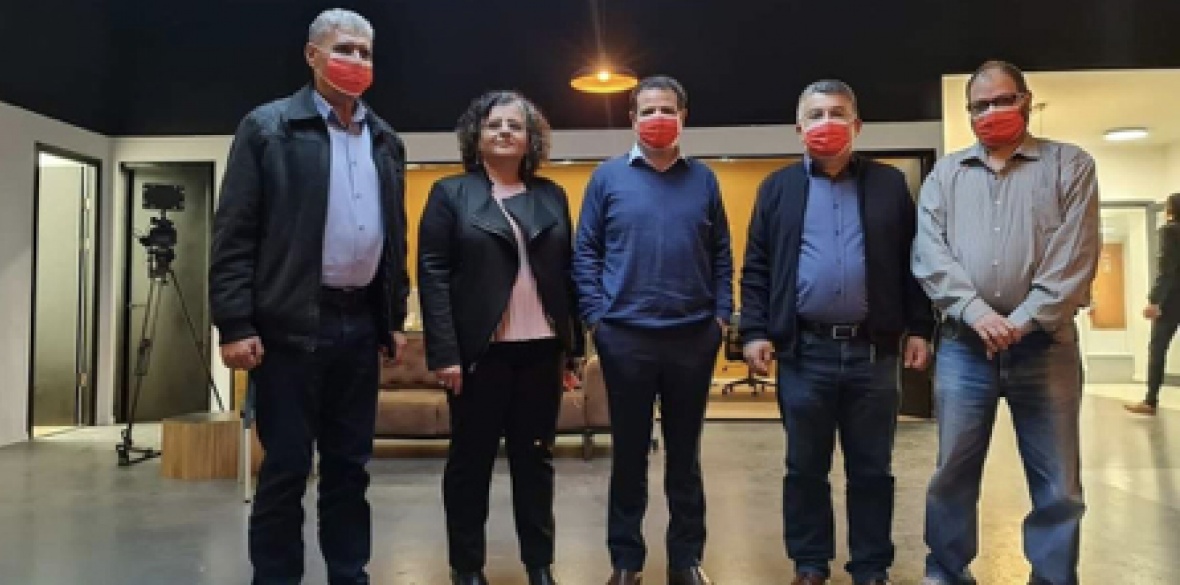This is the last article you can read this month
You can read more article this month
You can read more articles this month
Sorry your limit is up for this month
Reset on:
Please help support the Morning Star by subscribing here
THE ninth congress of Hadash (Democratic Front for Peace and Equality) and a conference of the Israeli Communist Party (Maki) took place virtually on Saturday January 16, with over 200 delegates in attendance.
The meetings happened in preparation for a fourth general election in two years and reaffirmed the important role of Hadash as part of the Joint List coalition in the Knesset (Israeli parliament), after recent events led to division within it.
The Joint List coalition is comprised of four political parties, of which Hadash is an important parliamentary force and the home party of its leader, Ayman Odeh.
Israel’s coalition government, consisting of PM Benjamin Netanyahu’s Likud and Benny Gantz’s Blue and White Party, dissolved after failing to receive parliamentary approval for its recent budget law.
The backdrop to this being the economic devastation faced by working-class people throughout the Covid-19 crisis.
Despite being among the first countries to roll out a mass vaccination for 1 million of its citizens, Israel’s unemployment rate is currently also at 1 million; thousands of businesses have closed and hospitals are reaching maximum capacity.
The political instability characterising the recent period galvanised Netanyahu’s efforts to sow division within the Joint List and its support base. Netanyahu’s January 13 visit to Nazareth, a prominent Arab city where the Joint List enjoys popular support, was met with protests which were in turn brutally suppressed by the police.
Officers dragged Member of Knesset (MK) Sondos Saleh (Arab Party for Change) away from the demonstration and assaulted three other MKs: Aida Touma-Sliman (Hadash), Mtnes Shihadeh and Hiba Yazbak (National Secular Party).
Netantyahu’s efforts to tear apart the Joint List — the only remaining party opposing his government — shows his fear of both Arab citizens and of true democratic forces, who strive for an end to the occupation and for justice.
Moreover, his attempts to lure the Islamic Movement (one of the Joint List parties) away from the coalition — by offering funds to counter violent crime in Arab towns, after years of neglect and incitement — can only be described as cynical and politically motivated.
Indeed, the Islamic Movement leader, Mansur Abbas, recently gave a television interview in which he attacked Ayman Odeh for what he described as failure to prevent the rising number of murders associated with violent crime in Arab society.
This comes just months after Odeh made a powerful speech on the matter in the Knesset, in which he expressed his grief for his murdered neighbours and stated clearly that it was Netanyahu’s government which is responsible for the safety of all citizens.
Women’s rights and gay rights were also central to this dispute, with the Islamic Movement left furious by Hadash parliamentarians lobbying for these issues. As a result, Hadash is struggling to maintain unity in the Joint List, after gaining 15 seats in the last general elections, making it the third largest parliamentary group in the Knesset.
Prominent leaders of Hadash and Maki have criticised Abbas’s new political approach as counterproductive and fawning.
Meanwhile, a dangerous rightward trend is appearing in Israeli politics, with recent polls predicting success for the right-wing parties Yamina (Naftali Bennett), New Hope ( Gideon Sa’ar) and Likud (Netanyahu). The mass protests of last summer have failed to influence the political system in a meaningful way, primarily due to their decentralised nature and lack of party structure.
This is a strong reminder of the crucial role of Hadash in uniting the Joint List and maintaining its power.
The future of the joint list is uncertain, as recent polls indicate it will gain less seats in the forthcoming election. However, the ninth congress of Hadash reasserted its confidence in the party’s five serving parliamentarians, in the hope of regaining a meaningful presence in the Knesset. Hadash and Maki leaders have urged all supporters of the Joint List to protect the unity between Palestinian citizens of Israel and democratic Jewish citizens.
It is only in this way in which all sections of the working class in Israel would be able to exercise control over the government, rather than resort to the sectarian and patriarchal-type politics of days gone by.
Zohar Alon is a member of the Israeli Communist Party and a Hadash Student Representative at Tel Aviv University — this article was written in a personal capacity.











